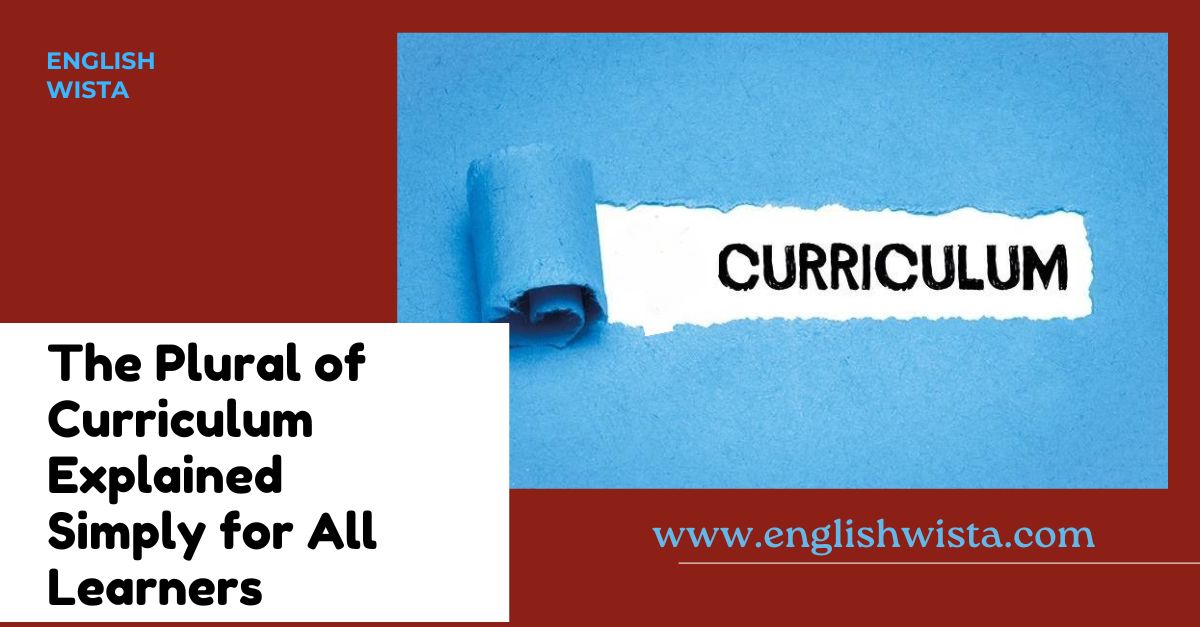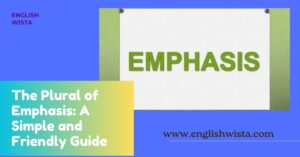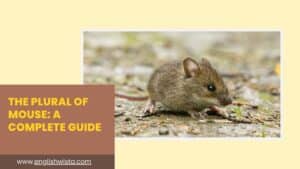If you’ve ever sat in a classroom, attended a training course, or browsed through a school website, you’ve probably come across the word curriculum. It sounds formal and academic, doesn’t it? But like any other word in English, when we talk about more than one curriculum, we need its plural form. That’s where things get interesting and sometimes confusing. Is it curriculums? Or maybe curricula? Which one is correct, and when should you use it?
Don’t worry if this question has left you scratching your head. You’re not alone! Many learners (and even native English speakers) wonder the same thing. In this article, we’ll take a fun, step-by-step look at the plural of curriculum. We’ll explore the options, dive into its history, and use lots of examples to make sure you feel completely confident by the end.
So, let’s get started and clear up the mystery of the plural of curriculum.
What Does Curriculum Mean?
Before we figure out the plural, it helps to understand the word itself.
A curriculum is basically a plan of study. It’s the set of subjects, lessons, or topics that a school, college, or program teaches. Think of it as the roadmap for learning.
For example:
- A high school curriculum might include math, science, history, and English.
- A university might offer a curriculum focused on engineering, business, or art.
- Even a cooking class has a curriculum it’s just the list of skills and recipes you’ll cover.
So in simple terms, a curriculum is “what you’re supposed to learn.”
What Is the Plural of Curriculum?
Here’s the answer you’ve been waiting for: The plural of curriculum can be curricula or curriculums.
Yes, both are correct! But there’s a catch: they’re not always used in the same way. Let’s break it down.
- Curricula
- This is the traditional plural form.
- It comes directly from Latin, which is the language the word curriculum originally came from.
- You’ll see curricula used often in formal or academic contexts.
- “The university offers different curricula for science and humanities students.”
- Curriculums
- This is the more modern, English-style plural.
- It follows the usual English rule of adding -s to make a word plural.
- It’s very common in everyday English and is widely accepted.
- “The school is comparing different curriculums to improve its teaching methods.”
So, both curricula and curriculums are correct. Which one you choose depends on the situation and your audience.
Which Form Should You Use?
You might be wondering: if both are right, how do you decide which one to use? Here’s a simple rule of thumb:
- Use curricula if you’re writing or speaking in a formal, academic, or professional setting.
- Use curriculums if you’re speaking in everyday English or want your sentence to sound simpler and more modern.
Think of it like choosing between formal clothes and casual clothes. Both are fine it just depends on the occasion!
Is Curriculum Singular or Plural?
Good question! Curriculum is always singular. It refers to just one program or set of lessons.
Example:
- “The curriculum for the new course is very detailed.”
The plural, as we’ve already learned, can be either curricula or curriculums.
Example:
- “Different schools have different curricula.”
- “Two new curriculums were introduced this year.”
Why Are There Two Plurals?
Here’s where things get interesting. English has borrowed many words from Latin. When that happens, sometimes we keep the Latin plural form, and sometimes we create a new English one.
- Curriculum comes from Latin, where the plural is curricula.
- Over time, English speakers also started saying curriculums, which felt more natural in English.
- Today, both are accepted, though curricula still has a slightly more “academic” feel.
It’s a bit like the word formula. Its plural can be formulas or formulae. Or the word alumnus, which becomes alumni in plural.
So, English often gives us two options: the traditional Latin version and the simpler English one.
Examples of Curriculum and Curricula in Sentences
Let’s make things crystal clear with some real-life sentences.
Using Curriculum (singular):
- “This year’s curriculum includes more focus on digital skills.”
- “The teacher designed a new curriculum for art students.”
- “A well-structured curriculum helps students learn more effectively.”
Curricula As (plural):
- “Medical schools around the world have different curricula.”
- “The committee reviewed the curricula of several universities.”
- “Our research compared the curricula in science and engineering programs.”
Using Curriculums (plural):
- “The school is experimenting with new curriculums for younger children.”
- “We looked at the curriculums of three online learning platforms.”
- “Different curriculums can lead to very different student experiences.”
Common Mistakes People Make
Let’s point out a few mistakes to avoid.
- Using curriculum as plural
- Wrong: “The school offers many curriculum.”
- Correct: “The school offers many curricula/curriculums.”
- Mixing the two plural forms in one sentence
- It’s best to pick one style and stick with it.
- Wrong: “Different curriculums and curricula were discussed.”
- Correct: “Different curricula were discussed.”
- Forgetting that curriculum is singular
- Remember, curriculum always refers to just one set of studies.
A Quick Definition Recap
- Curriculum (singular): A plan of study or course content.
- Curricula (plural): Traditional Latin plural form, used in formal settings.
- Curriculums (plural): Modern English plural form, used in casual or everyday contexts.
Both plurals are correct, so you can confidently use either one depending on the situation.
Fun Facts About the Word Curriculum
Want to impress your friends? Here are a few cool extras about this word.
- The word curriculum comes from the Latin word currere, which means “to run.” The idea was that a curriculum is like a “course” or a “path to run through.”
- The singular curriculum is often shortened to course in casual speech. For example, “The course covers algebra and geometry” instead of “The curriculum covers algebra and geometry.”
- Other English words from Latin with unusual plurals include:
- Datum → Data
- Medium → Media
- Phenomenon → Phenomena
- Stimulus → Stimuli
Comparing Curriculum with Similar Words
To make this even easier, let’s compare it with another tricky word: syllabus.
- Singular: syllabus
- Plural: syllabi or syllabuses
See the similarity? Just like curriculum, it has both a Latin plural (syllabi) and an English one (syllabuses).
This shows that English often gives us two correct plural options for words borrowed from Latin or Greek.
Real-Life Contexts Where You’ll Hear Curriculum
You’ll come across this word in many areas of life, not just in schools.
- Education: “The state’s curriculum includes science and technology.”
- Training programs: “The company updated its training curriculum.”
- Workshops: “The workshop curriculum focuses on leadership skills.”
- Online courses: “Different online platforms design their own curriculums.”
So whether you’re a student, a teacher, or even a professional taking training, you’ll hear this word used often.
How to Remember the Plural Easily
Here’s a simple memory trick:
- If you want to sound formal, think “Latin” → curricula.
- If you want to sound casual, think “English” → curriculums.
Say it a few times out loud, and it will stick!
Conclusion
The word curriculum might sound complicated at first, but now you know the secret: its plural can be curricula or curriculums. Both are correct, and the choice depends on your style and setting.
- Use curricula for formal, academic writing.
- Use curriculums for casual, everyday English.
- Remember that curriculum is always singular.
So the next time you’re talking about school programs, online courses, or training sessions, you’ll know exactly how to use the word like a pro.
In short, don’t be intimidated by the fancy look of the word. Whether you choose curricula or curriculums, you’ll be understood. And now, you can confidently explain it to someone else too!



